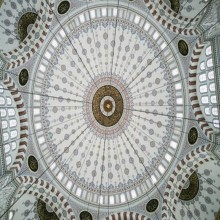-

Haya Muhammad Eid
No One to Thank
The Qur’an wonders in what areas and in what ways humans rely on their own strength when they fail to acknowledge God as the Giver, saying: “O humankind! What has made you careless concerning your Lord, the Most Generous?” (Qur’an 82:6)
-

Haya Muhammad Eid
Slave to Oneself
All humans, in the Qur’an’s own words, have a god – even if the god is the person himself. “Have you seen the one who takes as his god his own desire?” (Qur’an 24:43)
-

Haya Muhammad Eid
God is there
You are not more difficult to see than a black ant, scampering over a black rock, under the cover of the darkest of moonless nights.
-

Haya Muhammad Eid
The only cause of evil
Islam does not pass off all calamites as ‘trials,' but differentiates between punishments and trials. Trials are tests of character and faith; punishments are consequences of sins and transgressions.
-

Haya Muhammad Eid
Mercy is the Base … and Forgiveness Is a Promise
In Islam, one of God’s most emphasized attributes is mercy. All the chapters of the Qur’an except one begin with the statement “In the Name of God, the Merciful, the Compassionate,” known as the Basmallah. The Basmallah is also the common statement that Muslims should recite before doing any action. It thus ingrains in them the confidence that God’s ultimate design for creation is one of care and mercy.
-

Haya Muhammad Eid
The Problem of Evil
Atheism rejects the free will component, arguing that even if it provides a satisfactory explanation for moral evil produced by morally wrong human choices such as murder, adultery, and racism, it fails to address natural evil such as earthquakes, disease, hurricanes, and famines. This is because natural evil arises through no fault of humans, who are completely powerless to prevent it.
-

Haya Muhammad Eid
Who Is to Say What Is Right or Wrong?
"..The concept of moral obligation [is] unintelligible apart from the idea of God. The words remain but their meaning is gone.’” – William Lane Craig.
-

Haya Muhammad Eid
Moral Rationale for Denial of God
Atheism in its reality is a voluntary psychological position (and not a mental one) that a person adopts due to not wishing to imagine that there is a power above man to which he must submit and obey, and before which he will be accountable for his deeds.
-

Haya Muhammad Eid
Personalities are like metals
Personalities are like metals. They need to be further refined into purer forms and fashioned into useful shapes.
-

Haya Muhammad Eid
Where Does Morality Come From?
The entire concept of morality stems from the Islamic belief that humans are significant, that their behavior and actions will count and that the pattern of this entire universe is purposeful and balanced. Humankind is not a ship without a compass in the midst of a great storm, but is secured with a set of unchangeable norms for all possible moral situations.
-

Haya Muhammad Eid
Outlines of humanity in Islam
All humans, men and women, are descended from one soul: Adam (peace be upon him). From Adam, God created his wife, Eve (peace be upon her), and from them both He created the rest of the human race, which make all human beings equally valuable in His Sight, equally subject to His Sovereignty, equally deserving of His Grace, and equally accountable to Him for their deeds.
-

Haya Muhammad Eid
The Primordial Nature of All Human Beings
Very much at the center of understanding the human being in Islam is the concept of Fitrah. Fitrah is like having an innate inner compass that always points in the direction of what is right, true, and just.
-

Haya Muhammad Eid
The Illusion of free Will
Volition, emotion, and intellect are not free and rational, but entirely chemical.
-

Haya Muhammad Eid
Free Will and Moral responsibility
Free will is a faculty of the reason and soul, by which a human is capable of distinguishing and choosing right from wrong and good from evil.
-

Haya Muhammad Eid
No Time to Waste in Islam
The minute a human is born, the clock of their life starts ticking down, and it does not stop. “O son of Adam!” Muslim Scholar Hasan Al-Basri explained. “You are but days. Every day that goes by, a part of you goes with it.”
-

Haya Muhammad Eid
The Concepts of Worship and Viceregency on Earth
The Qur’anic statement, “To God we belong and to God is our return” (2:156) represents the Islamic map of life. It is an entire way of seeing and responding to the world, where life and every particle of it takes on direction, significance, and purpose when God is the beginning and the end.
-

Haya Muhammad Eid
Running life with disregard to the maker’s instructions
Humans can only become the person God created them to be and live life to its best and fullest meaning when they apply the rules and standards their Maker has set out for them in His Book. It, alone, can bring them to the purest and highest state of being and give them the best possible direction, as indicated in the Qur’anic verse: “Indeed, this Qur’an guides to that which is most just and right.” (Qur’an 17:9)
-

Haya Muhammad Eid
Purposeful Creation with a Purpose in Creation
The point of anything designed is to serve a purpose. And when the purpose of a thing is not known and understood, the abuse of that thing becomes inevitable.
-

Haya Muhammad Eid
Purpose: Reason for Being
Within every human is an innate desire for ultimate meaning and purpose. It cannot be escaped, as it goes to the root of human nature. Deep inside, humans want their lives to count for something much more than mere existence.
-

Haya Muhammad Eid
Worldview of World-Renowned Thinkers
“Modern man is the Cosmic Orphan because he has killed God. And, by doing so, he has reduced himself to an accident of nature. When he asks, Why? his cry is lost in the silence of the recesses of space. When he dies, he dies without hope. Thus, in killing God, modern man has killed himself as well.” -William L. Craig.
Atheism





















